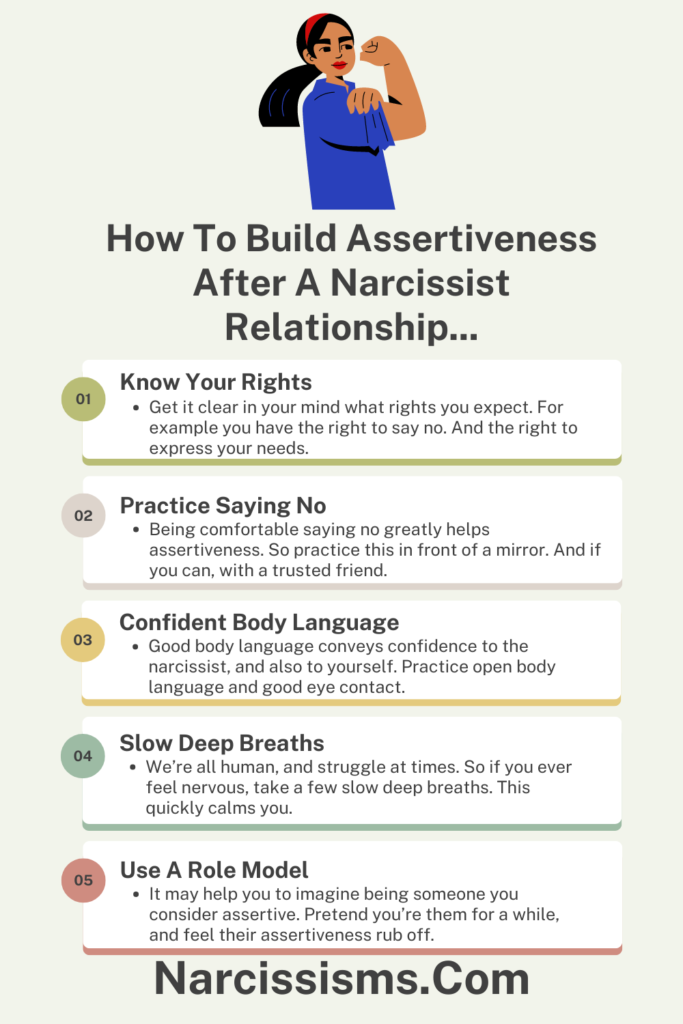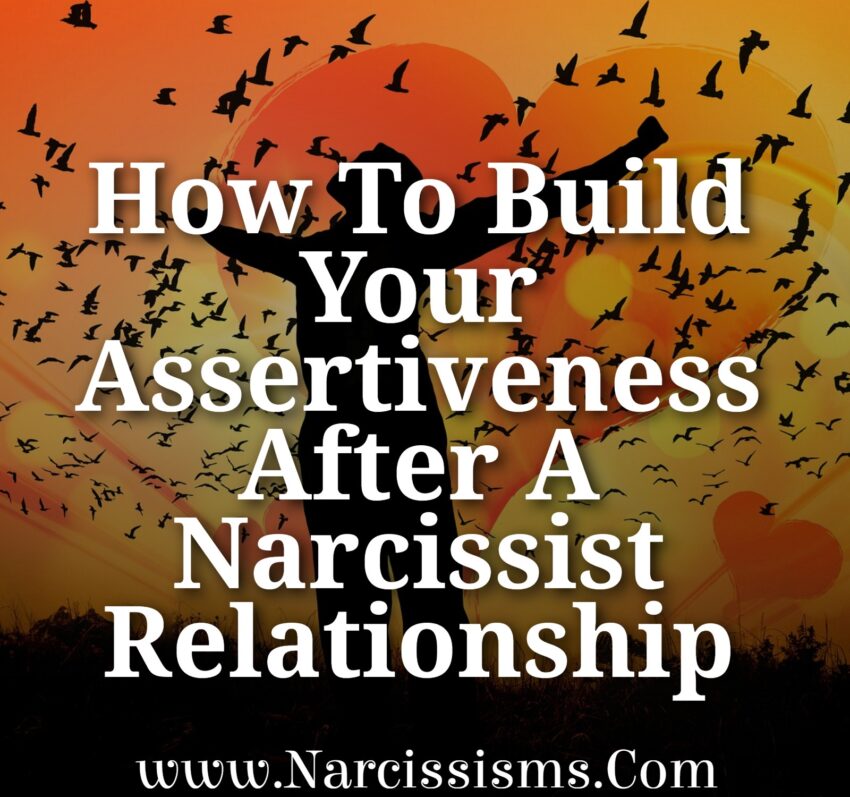Assertiveness is the sweet spot between passive and aggressive. When you’re assertive, you express your thoughts, feelings, and needs openly and honestly, while respecting others. Think of it as standing your ground, without stepping on anyone else’s shoes.
Narcissists often target passive people. But even if you weren’t passive before, you may be after the narcissist has finished with you.
Narcissists wear us down over time, as they constantly test our boundaries. And use mind games and manipulations to get their way.
After a while, a once confident and assertive person can become a shell of their former self. But you can get it back. And you can learn to be assertive, if you weren’t before.
Being assertive boosts your self-esteem, reduces stress, and improves your relationships. When you communicate assertively, people are more likely to understand your perspective, and respect your boundaries. And you feel better about yourself.
Here’s some practical tips to help you improve your assertiveness…
Please Watch The Following Short Video To Aid Your Understanding…
Know Your Rights
To be assertive, it’s important to clearly know your rights. The things you should expect from others. Because when you do, you can be clear with your conviction. And you won’t be caught “cold” when someone unexpectedly crosses the line. Here’s a few rights you should expect…
You have the right to express your own thoughts, feelings, and needs. And not be expected to agree with someone all the time. Anyone who tries to stop you, doesn’t have your best interests at heart. And they clearly don’t care about your views or opinions. So what kind of relationship is that?
You have the right to choose who’s in your life. Even family. So if someone is negatively affecting you, then you have the right to remove them. Because it’s YOUR life, and you choose who’s in it.
You have the right to say “no” to things asked of you. If you didn’t have this right then you’d be a slave. But luckily slavery was abolished years ago!
It may help to write down the rights you expect from others. Then you have a clear guide if someone tries to breach them.
Practice Saying “No”
If you struggle saying no, then practice helps. Start small and build yourself up. Say no to a small request, then build from there. It gets easier and more comfortable, the more you do it.
If you prefer, you could role play with a trusted friend. And practice scenarios where you say no. You can even do this alone if you prefer.
Remind yourself that you have the right to say no. And saying no doesn’t make you a bad person. Also, saying no isn’t rejecting the person. It’s rejecting the request. This is an important distinction, because narcissists often try to make you feel guilty, as if you’re rejecting them. So get it clear in your head that you’re not.
If someone falls out with you after you say no, then they’ve done you a favour. Because they’re not a true friend. They’re a user who wants someone to control. A true friend would want you to say no, if it was something you didn’t want to do.
Use “I” Statements
Frame your thoughts and feelings with “I” statements. For example, say “I feel overwhelmed with this much work,” rather than “You always give me too much work.”
This conveys your message, without sounding accusatory. And feels more comfortable to say. Plus it’s less likely to end in conflict.
Other “I” statements include “I disagree”, rather than “You’re wrong”. And “I would like your help”, rather than “You need to do this”.
Maintain Eye Contact
It’s important to maintain eye contact when being assertive. Because it lets the other person know you’re serious. And it let’s you know too!
Good eye contact makes you feel more confident. Because it shows you’re not hiding away. So psychologically you don’t feel like prey.
Practice this in non confrontational situations. And get comfortable making good eye contact. Then it feels more natural for when you need it.
Use Open Body Language
Open body language encourages others take you more seriously. It also helps with your own confidence. Because if you’re looking at the floor, and twiddling your thumbs, you’re not sending yourself a good message. And this will be picked up by most people, especially narcissists.
Lift your chin a little, and puff out your chest. And keep your body open, rather than crossed and defensive.
It may help to film yourself in interactions, to see how your body language looks to others. Because you may have some bad habits you’re not aware of.
Take A Few Slow Deeps Breaths
If you ever feel nervous, take a few slow deep breaths before you talk. This instantly calms you. And helps clarity of thought.
Narcissists are masters at looking for weakness. And if they see you’re nervous, they may keep hammering away at you. Hoping you crack under the pressure. But if they see you’re calm and composed, they’re more likely to give up.
Use A Role Model
Some people find it useful to have a roll model. Someone you look up to, who’s assertive.
This could be someone you personally know. Or even a celebrity. Pretend you’re them. And think how they’d deal with a situation.
This can be incredibly powerful to fast track you into an assertive frame of mind. And after a while you’ll no longer need this role model, as it becomes second nature.
Final Thoughts
Improving your assertiveness is a journey, not a destination. Practise these skills, and be kind to yourself along the way. Remember, everyone has moments of doubt, and it’s OK to take things one step at a time.
Next time you’re in a situation where you need to speak up, take a slow deep breath, remind yourself of these tips, and go for it. The more you do it, the better you get.
Soon you’ll find that people respond positively to your assertiveness, and treat you noticeably better. Plus you’ll feel more confident and empowered. You won’t always get things perfect, but you will improve over time.
Narcissists knock our confidence and self esteem. But you can build it back up. Especially once they’re no longer around to drag you down. Keep practising and growing, and world is your oyster!
Please CLICK HERE For How To Boost Your Confidence After A Narcissist Relationship
Or Scroll Down For My Most Popular Articles…

